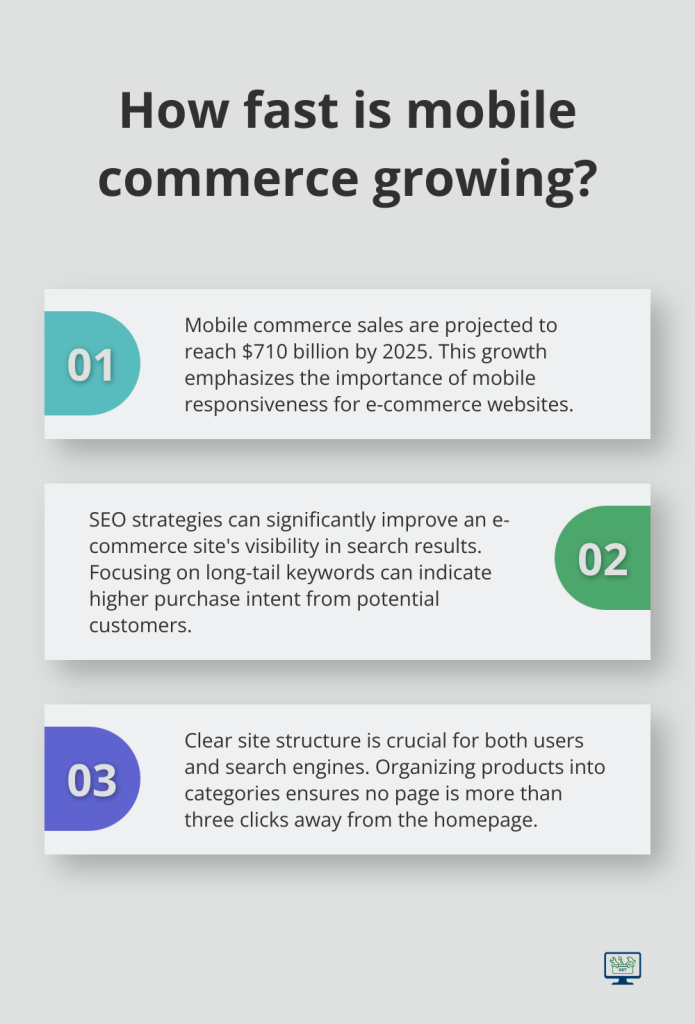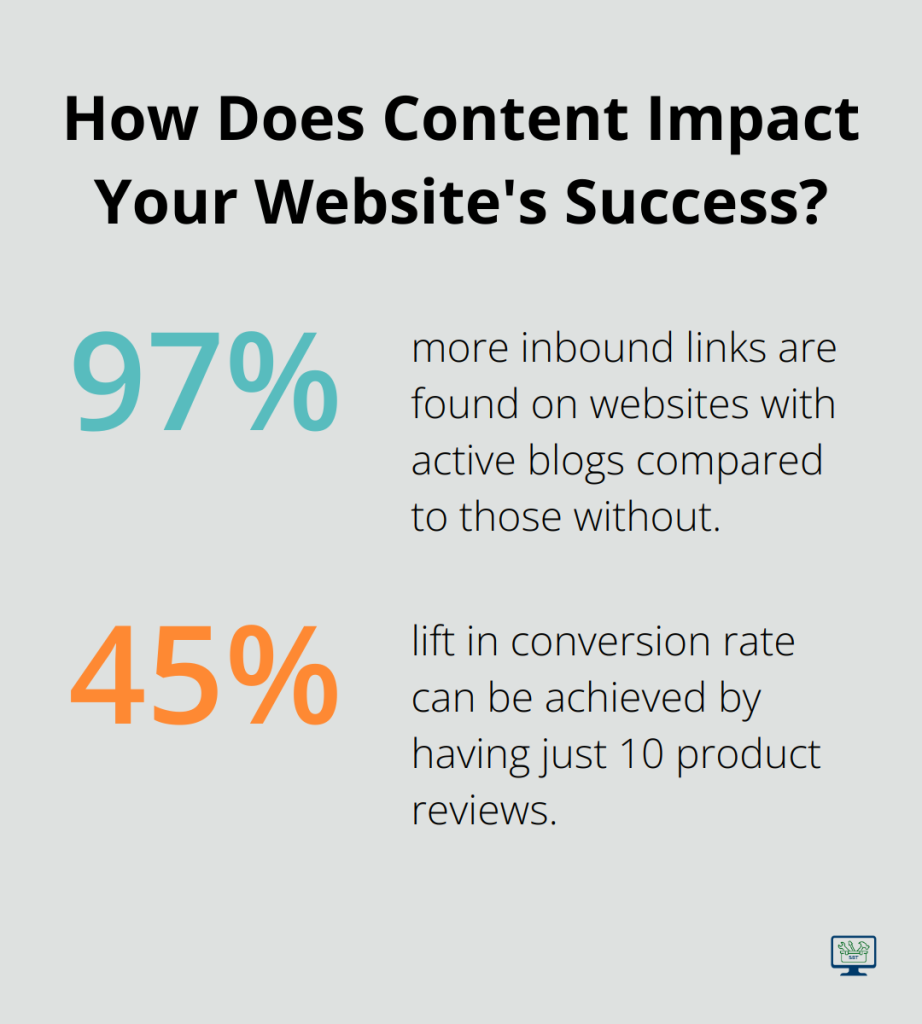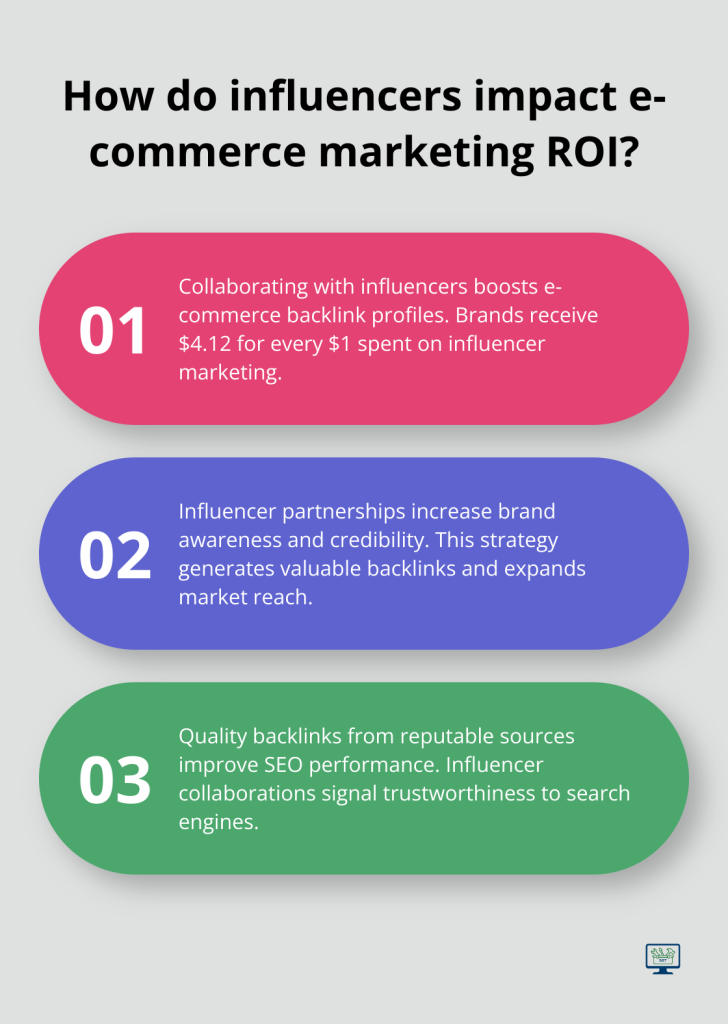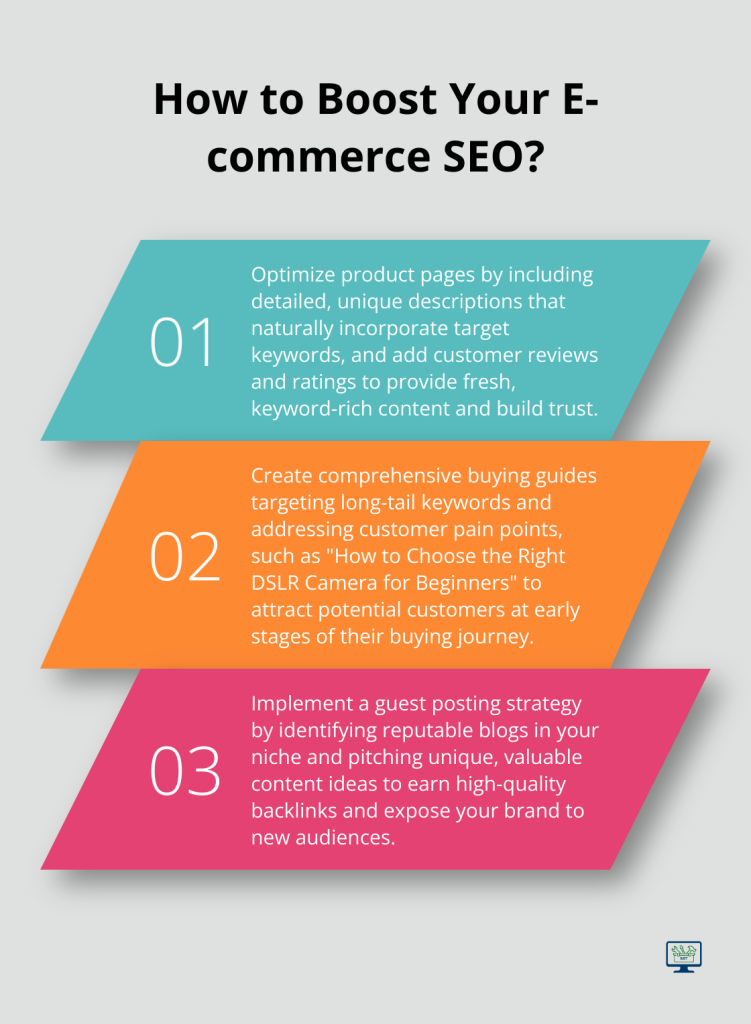E-commerce SEO marketing is the key to unlocking your online store’s full potential. In today’s competitive digital landscape, simply having great products isn’t enough.
At SmallBizToolbox, we’ve seen firsthand how effective search engine optimization can skyrocket e-commerce sales. This guide will show you practical strategies to boost your visibility, attract more customers, and increase your bottom line.
How to Optimize Your E-commerce Website for Search Engines
Search engine optimization (SEO) can transform e-commerce businesses. A well-optimized website increases visibility in search results, attracting more potential customers to your online store. Let’s explore practical strategies to enhance your e-commerce site’s SEO.
Master Keyword Research
Identify the terms your potential customers use to find products like yours. Tools such as Google Keyword Planner and Semrush help discover high-volume, low-competition keywords relevant to your products. Focus on long-tail keywords, which are more specific and often indicate higher purchase intent. For example, try to target “best waterproof running shoes for men” instead of just “running shoes.”
Streamline Site Structure
A clear, logical site structure helps users and search engines navigate your e-commerce store efficiently. Organize your products into categories and subcategories, ensuring no page is more than three clicks away from the homepage. This hierarchy improves user experience and distributes link equity throughout your site, boosting overall SEO performance.
Supercharge Product Pages
Your product pages drive sales. Make each page a powerhouse of relevant information. Include detailed, unique product descriptions that naturally incorporate your target keywords. Optimize your product titles, meta descriptions, and image alt tags.

Add customer reviews and ratings to your product pages. These elements provide fresh, keyword-rich content and build trust. A study aims to analyze the impact of online reviews and product ratings on consumer purchasing decisions on e-commerce platforms.
Turbocharge Site Speed and Mobile Responsiveness
In e-commerce, speed matters. Use tools like Google PageSpeed Insights to identify and fix speed issues. Compress images, leverage browser caching, and consider using a content delivery network (CDN) to serve your content faster.
Mobile commerce sales are projected to reach $710 billion by 2025. Test your site across various devices and screen sizes to guarantee a seamless shopping experience for all users.
These SEO strategies set your e-commerce site up for success. SEO requires ongoing effort, so monitor your performance and adjust your tactics as needed. As you implement these techniques, you’ll notice improvements in your search engine rankings. But SEO is just one piece of the puzzle. Let’s move on to creating SEO-friendly content that will engage your customers and boost your e-commerce sales even further.
How to Create Compelling SEO Content for E-commerce
Creating SEO-friendly content for your e-commerce store attracts and engages potential customers. Well-crafted content boosts organic traffic and sales significantly. Let’s explore effective strategies to develop content that resonates with both search engines and shoppers.
Craft Irresistible Product Descriptions
Product descriptions are prime real estate for SEO. Make them informative, engaging, and optimized for search engines. Include relevant keywords naturally, focusing on the features and benefits that matter most to your customers. For example, when selling running shoes, don’t just list technical specifications. Describe how the shoes will improve the runner’s performance and comfort.

A Nielsen Norman Group study found that missing or unclear product information can lead to purchase failures. Be thorough in your descriptions, addressing common customer questions and concerns. This approach improves your SEO and increases conversion rates.
Develop Comprehensive Buying Guides
Buying guides target long-tail keywords and address customer pain points effectively. They provide value to your audience while improving your site’s authority on specific topics. For instance, if you sell cameras, create a guide on “How to Choose the Right DSLR Camera for Beginners”. This type of content ranks well for informational queries and attracts potential customers at the early stages of their buying journey.
Launch a Strategic Blog
A blog targets a wide range of keywords and provides valuable information to your audience. HubSpot reports that websites with active blogs have 434% more indexed pages and 97% more inbound links than those without. Focus on topics related to your products and industry, addressing common questions and concerns of your target audience.
If you sell kitchen appliances, write blog posts like “10 Time-Saving Recipes for Busy Professionals” or “How to Choose the Right Blender for Your Smoothie Needs”. These posts rank for long-tail keywords and drive targeted traffic to your site.
Harness the Power of User-Generated Content
User-generated content (UGC) is a goldmine for e-commerce SEO. Customer reviews, Q&As, and user photos provide fresh, keyword-rich content that search engines love. They also build trust and credibility with potential buyers. Bazaarvoice research shows that having just 10 product reviews can lift conversion rate by 45%.
Encourage customers to leave detailed reviews by sending follow-up emails after purchase. Try implementing a Q&A section on your product pages where customers can ask and answer questions. This provides valuable information for other shoppers and creates unique, relevant content for each product page.
These content strategies create a rich, informative ecosystem around your products that attracts organic traffic and guides potential customers through their buying journey. Consistency in content creation keeps your site relevant and engaging for both search engines and shoppers. Now, let’s explore how to build a strong backlink profile to further boost your e-commerce site’s SEO performance.
How to Build Backlinks for E-commerce Success
Building a strong backlink profile boosts your e-commerce site’s SEO performance. Quality backlinks from reputable sources signal to search engines that your site is trustworthy and authoritative. Let’s explore effective strategies to build a robust backlink profile for your online store.
Collaborate with Industry Influencers
Partnering with influencers in your niche can significantly improve your backlink profile. Identify influencers whose audience aligns with your target market. Offer them your products for review or collaborate on content creation. Brands get $4.12 for every $1 spent on influencer marketing. This approach not only generates valuable backlinks but also increases brand awareness and credibility.
Create Linkable Assets
Develop high-quality, shareable content that naturally attracts backlinks. Infographics, industry reports, and comprehensive guides are excellent examples of linkable assets. For instance, if you sell fitness equipment, create an infographic on The Most Effective Home Workout Routines. Ensure your content provides unique insights or data to increase its shareability and link-worthiness.
Leverage Digital PR
Digital PR combines traditional public relations tactics with content marketing, social media, and SEO to boost online visibility. Reach out to industry publications, podcasts, and news sites with newsworthy stories about your brand or expert insights on industry trends. Providing valuable information to these outlets can earn you high-quality backlinks and media mentions.
Implement a Guest Posting Strategy
Guest posting remains an effective way to build backlinks and establish authority in your industry. Identify reputable blogs in your niche and pitch them unique, valuable content ideas. This strategy not only earns you backlinks but also exposes your brand to new audiences. Try to focus on quality over quantity (guest posts on authoritative sites will yield better results than numerous posts on low-quality blogs).
Engage in Online Communities
Participate actively in relevant online communities and forums (such as Reddit, Quora, or industry-specific platforms). Share your expertise, answer questions, and provide valuable insights. While many of these platforms use “nofollow” links, they can still drive traffic to your site and increase brand visibility. Moreover, your contributions may lead to opportunities for collaboration or mentions on other websites.

Final Thoughts
E-commerce SEO marketing transforms online store performance. We at SmallBizToolbox recommend you optimize your website structure, create valuable content, and build a strong backlink profile. These strategies will increase your visibility and competitiveness in the digital marketplace. Search engines evolve constantly, so you must update your tactics regularly to stay ahead.

Consistent application of these strategies leads to long-term success. Start with website optimization, then focus on creating engaging content that resonates with your target audience. Build authority through quality backlinks. SEO requires patience, but the results are worth the investment (especially for small businesses looking to grow their online presence).
SmallBizToolbox offers tools and resources to support your e-commerce SEO efforts. Our suite includes AI-driven content creation and SEO optimization aids. Take action today and implement these strategies to boost your e-commerce sales. Your future customers are searching – make sure they find you.
How useful was this Resource?
Click on a star to rate it!
Average rating 0 / 5. Vote count: 0
No votes so far! Be the first to rate this post.
We are sorry that this post was not useful for you!
Let us improve this Resource!
Tell us how we can improve this Resource?




